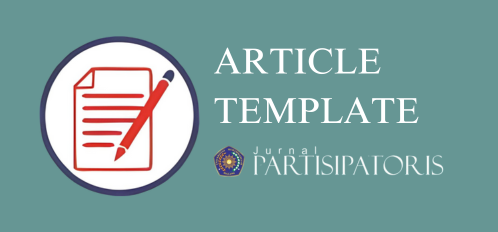KAPASITAS PEMERINTAH DESA SARDONOHARJO KABUPATEN SLEMAN DALAM IMPLEMENTASI PENGELOLAAN DANA DESA TAHUN 2021
DOI:
https://doi.org/10.22219/jp.v5i2.35149Abstract
This research examines the capacity of the Sardonoharjo village government in implementing village fund management during the pre-pandemic and Covid-19 pandemic era. To study this problem, researchers used implementation theory according to Van Meter and Van Horn. This study uses descriptive qualitative methods and researchers act as research instruments. Data obtained through observation, interviews, and documentation studies. The results of this study indicate that village fund management, in the government of Sardonoharjo village before the Covid-19 pandemic, prioritized the use of village funds for village strategic program activities that were cross-sectoral in nature. The activity program is both physical and non-physical development. For physical development, the Sardonoharjo Village government focuses on repairing and maintaining infrastructure for the most basic needs of village communities, such as water irrigation, roads, lighting, village economic stalls, agricultural business development, while non-physical programs or activities The Sardonoharjo Village Government prioritizes service program activities that are basic services. which directly brings benefits to improving the economy and quality of life of village communities such as public health, improving the economy through the development of superior village products, and others. before the Covid-19 pandemic, the use of village funds during this pandemic was used for non-physical program activities, while development activities of a physical nature were abolished which focused on the economic recovery of rural communities, in the form of providing direct village cash assistance (BLT), and revitalizing village-owned enterprises.
Downloads
References
Aminah, S., & Sutanto, H. S. (2018, oktober 18). Matra Pembaruan. Analsis Tingkat Kapasitas Aparatur Pemerintah Desa Di Kabupaten Bogor, 149-160.
Nain, U. (2019). PEMBANGUNAN DESA Dalam Prespektif Sosiohistoris. (M. Dr.
Muhammad Faisal, Ed.) Makasar: GARIS KHATULISTIWA.
Adisasmita, R. (2006). pembangunan pedesaan dan perkotaan. Yogyakarta: Graha Ilmu.
Agustino, L. (2008). Dasar-Dasar Kebijakan Publik, Bandung: Alfabeta. Azwar, S. (2009). Metode Penelitian (Cet 9 ed.). Yogyakarta: Pustaka Pelajar.
Budi, Winarno. (2002). Kebijakan Publik, Teori dan Proses. Yogyakarta: Media, 141.
Cahyono, H., Letty, N. L., & Moch. N. (2020, Juni 4). Pengelolaan dana desa. Studi Dari Sisi Demokrasi dan Kapasitas Pemerinta Desa, XiX- 249.
Dwijowijoto, R. N. (2003). Kebijakan Publik Formulasi, Implementasi dan Evaluasi.
Herdiyansyah, H. (2019). Metodologi Penelitian Kualitatif untuk Ilmu-ilmu Sosial. Salemba Humanika.
Van Meter, & Van Horn. (1975). The Policy Implementation Process: A Conceptual Framework”. Administration and Society.
Indrawati, S. (2017). buku-pintar-dana-desa. Jakarta: Kementrian Keuangan Republik Indonesia.
Kurniawan, W., & Maani, K. (2019). Jurnal Mahasiwa Ilmu Administrasi Publik (JMIAP). Implementasi Kebijakan Pembangunan Infrastruktur Jalan di Kecamatan Tabir Selatan Kabupaten Merangin dengan Menggunakan Model Donald Van Metter dan Carl Van Horn, 1, 67 - 78.
Moleong, L. J. (2018). Metodologi penelitian kualitatif (Cetakan ketiga puluh delapan ed.). Bandung: PT Remaja Rosdakarya.
Nismawati. (2021). Skripsi. Pengelolaan Dana Desa Ditengah Pandemi Covid-19 (Studi Kasus di Desa Bulu Allaporenge Kecamatan Bengo Kabupaten Bone).
Nugrahani, F. (2014). metode penelitian kualitatif dalam Penelitian Pendidikan Bahasa. Surakarta.
Sugiyono. (2016). Metode Penelitian Kuantitatif, Kualitatif dan R&D. Alfabeta.
Sumarto. (2006). Skripsi. Pengaruh Kondisi Sosial Ekonomi dan Pendidikan Orangtua Terhadap Motivasi Melanjutkan Pendidikan Ke Perguruan Tinggi Pada Siswa SMA NU 01 Wahid Hasyim Talang Tegal.
Sunyoto, D. (2013). Metodologi Penelitian Akuntansi. Bandung: PT Refika Aditama Anggota Ikapi.
Umar, H. (2005). Evaluasi Kinerja Perusahan, Teknik Evaluasi Bisnis dan Kinerja Perusahan Secara Komprehensif, Kuantitatif, dan Moderen. Jakarta: PT Gramedia Pustaka Utama.
Van Meter, & Van Horn. (1975). The Policy Implementation Process: A Conceptual Framework”. Administration and Society.
Wahab, A. (2008). Analisis Kebijakan dari formula ke Implementasi.
Winarno, B. (2014). Kebijakan publik: teori, proses, dan studi kasus (Cet.2, Ed. rev. ed.). Yogyakarta: Yogyakarta: CAPS.
Yusuf, M. (2017). Metode Penelitian Kuantitatif, Kualitatif & Penelitian Gabungan. Jakarta: Kencana.
Zainuri, A., & Masduki, Y. (2020). Mensinergikan Strategi Manajemen Dalam Dunia Pendidikan. Yogyakarta: CV. Tunas Gemilang Press.
Downloads
Published
How to Cite
Issue
Section
License

This work is licensed under a Creative Commons Attribution-ShareAlike 4.0 International License.
Authors who publish with Jurnal Partisipatoris agree to the following terms:
- For all articles published in the Jurnal partisipatoris, copyright is retained by the authors. Authors give permission to the publisher to announce the work with conditions. When the manuscript is accepted for publication, the authors agree to the automatic transfer of non-exclusive publishing rights to the publisher.
- Authors retain copyright and grant the journal right of first publication with the work simultaneously licensed under a Creative Commons Attribution-ShareAlike 4.0 International License that allows others to share the work with an acknowledgment of the work's authorship and initial publication in this journal.
- Authors are able to enter into separate, additional contractual arrangements for the non-exclusive distribution of the journal's published version of the work (e.g., post it to an institutional repository or publish it in a book), with an acknowledgment of its initial publication in this journal.
- Authors are permitted and encouraged to post their work online (e.g., in institutional repositories or on their website) prior to and during the submission process, as it can lead to productive exchanges, as well as earlier and greater citation of published work (See The Effect of Open Access).











